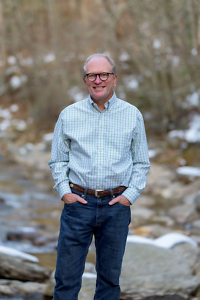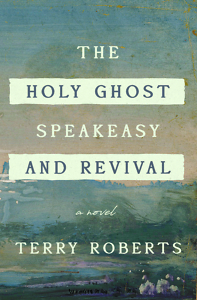Profiteer and Prophet
The “man of God” at the center of Terry Roberts’s latest novel is a portrait in contradictions
The Holy Ghost Speakeasy and Revival by Terry Roberts is a lyrical, dreamlike meditation on faith and death. It’s also a page-turning yarn about a law-breaking, wife-stealing, moonshine-running “man of God” and the adventures and misadventures of his traveling crusade. Watching Roberts deftly weave these two strands together is a treat.
 “You’re a kind of cornfield Aristotle, aren’t you—profiteer and prophet?” That’s what legendary journalist H.L. Mencken asks when he meets the fictional Jedidiah Robbins, known throughout the novel as “the Preacher.” It’s a description that’s as good as any. Though his “faith” is merely an outward show, a performance for an audience of believers, the Preacher is prone to dreams and visions, including conversations with the specter of Death himself. Haunted by guilt over the accidental drowning of his young wife many years earlier, he continues to seek her guidance by writing letters that he “mails” to her by burning them.
“You’re a kind of cornfield Aristotle, aren’t you—profiteer and prophet?” That’s what legendary journalist H.L. Mencken asks when he meets the fictional Jedidiah Robbins, known throughout the novel as “the Preacher.” It’s a description that’s as good as any. Though his “faith” is merely an outward show, a performance for an audience of believers, the Preacher is prone to dreams and visions, including conversations with the specter of Death himself. Haunted by guilt over the accidental drowning of his young wife many years earlier, he continues to seek her guidance by writing letters that he “mails” to her by burning them.
There’s no question that the Preacher has a gift: he can deliver the emotional experience his audience craves, preaching “with the madness and fire he’d known when he was a young man,” Roberts writes. “He preaches with the passion of youth flaming out of his vitals, smoking from his nostrils. It was as if he’d set himself on fire in the pulpit in a self-immolation of words. And the crowd melts before him … They scream and collapse and dance in place as if possessed by some winged angel composed of smoke and ashes.”
 From Florida to Georgia, Tennessee to North Carolina, the Preacher and his motley crew ride the rails in train cars dubbed the “Sword of the Lord” and “Saint John the Baptist,” fully loaded with roustabouts, horses, and even a repurposed circus tent. Together they a cut a swath through the rural American South of the Prohibition-haunted 1920s, peddling salvation in revival tents and “sin in a bottle”—purchased from mountain bootleggers—in backroom speakeasies far and wide. The Preacher is a complex character—comfortable with lying, stealing, adultery, and even brutal violence when provoked, and proud to deliver to his audience “both alcohol and God, the fiery spirits from a bottle and fiery Spirit from a book.”
From Florida to Georgia, Tennessee to North Carolina, the Preacher and his motley crew ride the rails in train cars dubbed the “Sword of the Lord” and “Saint John the Baptist,” fully loaded with roustabouts, horses, and even a repurposed circus tent. Together they a cut a swath through the rural American South of the Prohibition-haunted 1920s, peddling salvation in revival tents and “sin in a bottle”—purchased from mountain bootleggers—in backroom speakeasies far and wide. The Preacher is a complex character—comfortable with lying, stealing, adultery, and even brutal violence when provoked, and proud to deliver to his audience “both alcohol and God, the fiery spirits from a bottle and fiery Spirit from a book.”
Yet he is also a loving father and a generous leader, faithful to a moral code that prizes compassion, loyalty, and fair play while despising the greed, bullying, and the hypocrisy of small-minded tyrants. The Preacher shares the hopes and disappointments, tragedies and celebrations of those to whom he ministers, one town after another, as well as those with whom he travels. A child drowns, a fire consumes man and beast, a dangerous flood surges, his own life is threatened—these experiences mark him even as he pockets hundreds or even thousands of dollars a night, mostly by telling people what they want to hear: that they are sinful creatures who can be saved from damnation only by humbling themselves before an angry God.
Despite his ability to manufacture convincing trappings of faith, the Preacher is taken aback when he comes across the real thing. As Lester Caldwell, a farmer who doubles as the local minister, grabs his hands and begins to pray, something odd happens:
It’s as if a surge of electricity courses through the old farmer’s bones and sinews, through his wiry, calloused hands and into the Preacher. The Preacher’s own palms begin to tingle and then his arms to itch. Rather than an old farmer’s hands, it’s as if he’s grasping two cables shot with electric current. Sweat beads on his forehead as his chest and face grow warm and heavy. Something is traveling out of Lester Caldwell and into his body as the old man sings at God. Something powerful. Am I having a heart attack? he wonders to himself. Or is this mountain farmer some kind of saint?
Roberts portrays the Preacher’s surprising journey toward something like forgiveness, if not salvation, as he navigates both the turbulent waters of his own fears and regrets and the all-too-real brutality of small-town sheriffs and vengeful Ku Klux Klan members, among other risks. Only love can save the Preacher in the end—the love of his family and friends and maybe, coming as a surprise to the Preacher most of all, the all-consuming love of a merciful God.

A graduate of Auburn University, Tina Chambers has worked as a technical editor at an engineering firm and as an editorial assistant at Peachtree Publishers, where she worked on books by Erskine Caldwell, Will Campbell, and Ferrol Sams, to name a few. She lives in Chattanooga.


